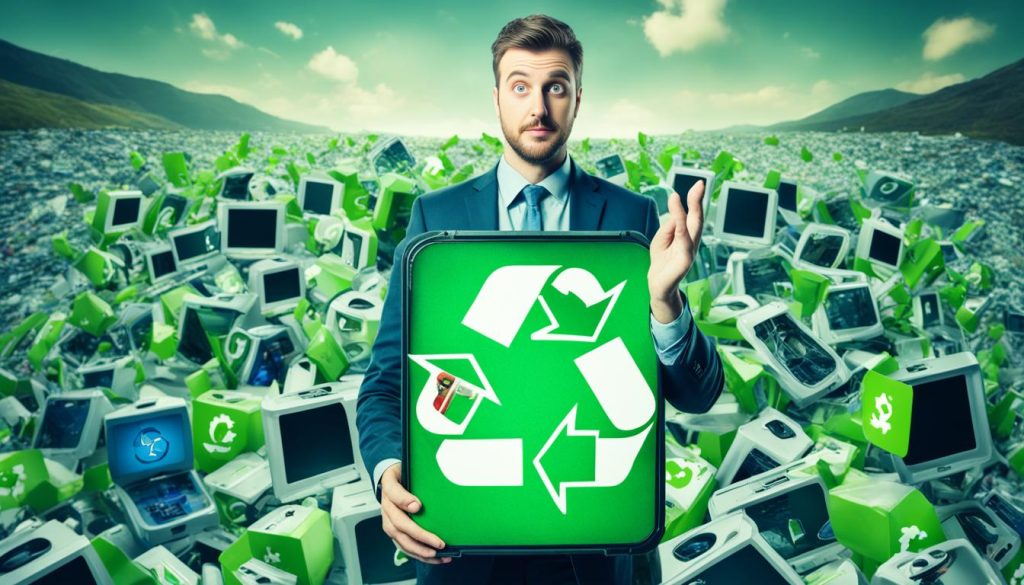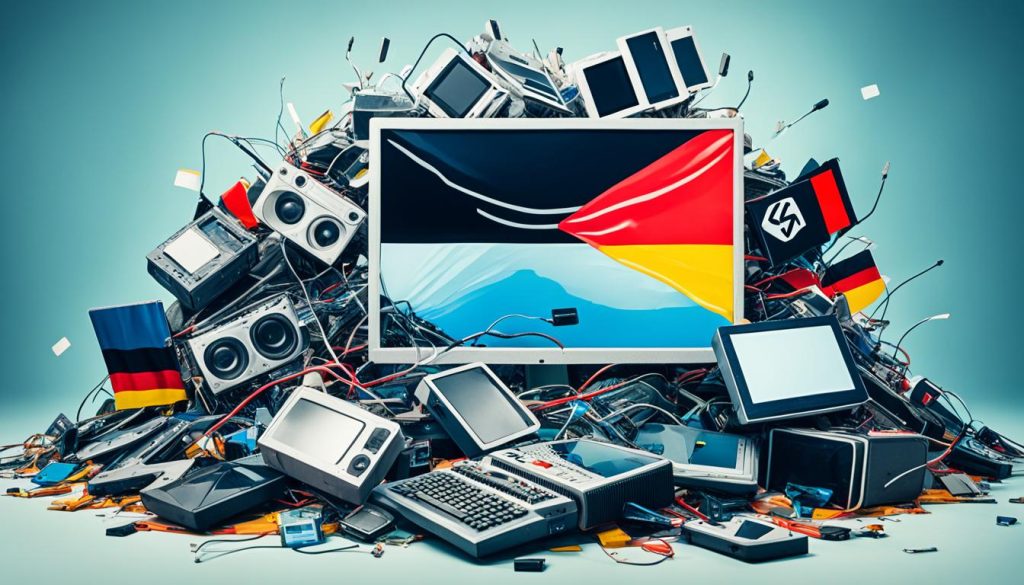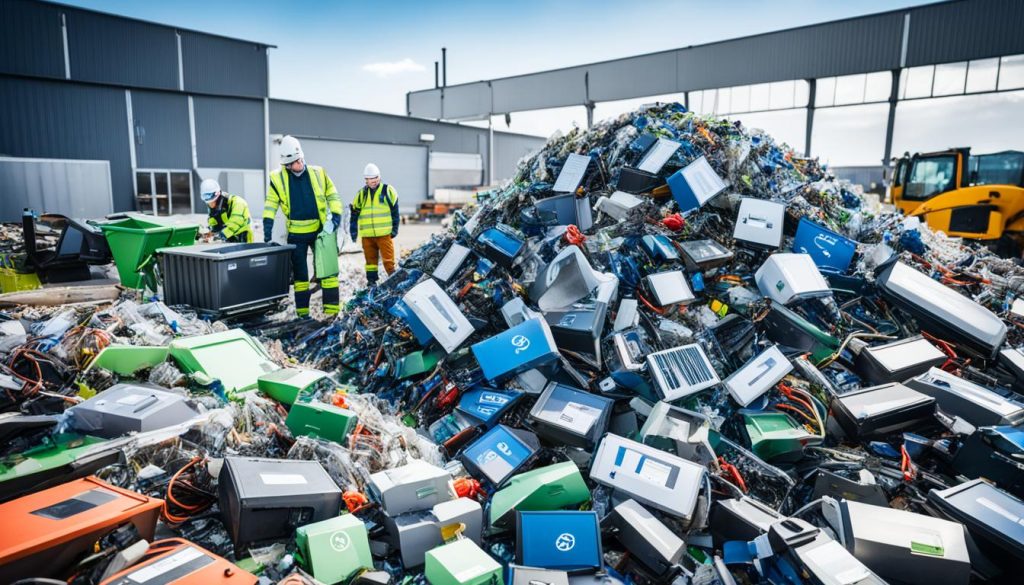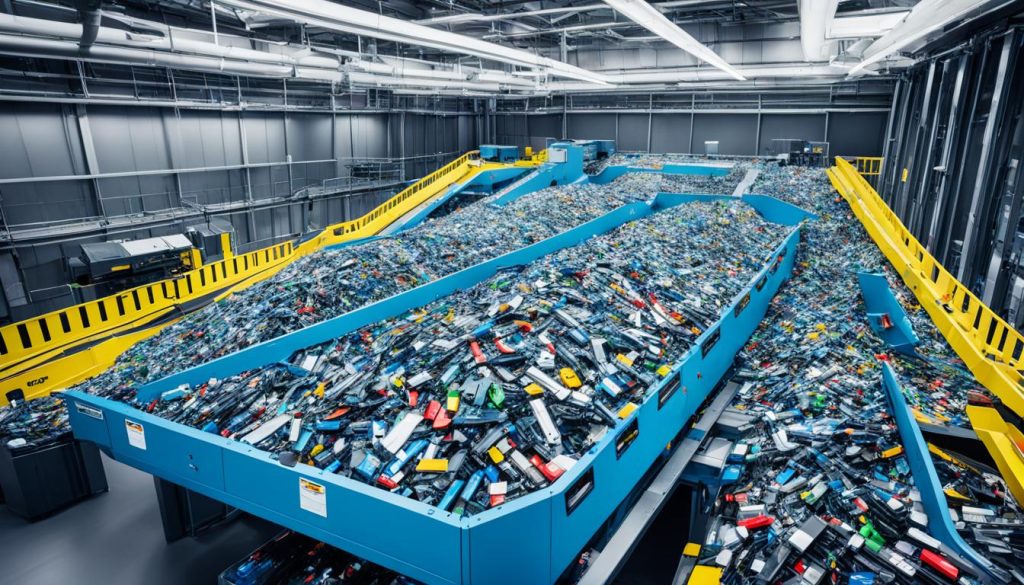Germany is at the forefront in dealing with e-waste issues. It has made great progress in collecting and recycling electronic items. In 2018, they collected almost 853,124 tons of e-waste. Of this, about 772,934 tons came from homes. This equals 9.31 kilograms per person.
- Introduction to E-waste Management
- The Scale of E-waste in Germany
- Legal Framework Governing E-waste
- Divided Product Responsibility
- Municipal Recycling Centres in Germany
- Best Practices in E-waste Collection
- Methods of E-waste Recycle and Reuse
- Specific Recycling Techniques for Different Devices
- Germany’s E-waste Recovery and Recycling Rates
- Challenges in E-waste Management
- Improving Collection Rates
- Enhancing Recovery of Precious and Special Metals
- Case Studies of Successful E-waste Management Initiatives
- E-waste Management in Germany: Best Practices
- Future Directions for E-waste Management in Germany
- The Role of Consumers in E-waste Management
- International Impact and Inspiration
- Source Links
The rest came from businesses. These numbers show how dedicated Germany is to handle e-waste from both homes and companies well.
Key Takeaways
- Germany collected nearly 853,124 tons of e-waste in 2018.
- Households contributed 772,934 tons of collected e-waste.
- This amounts to 9.31 kilograms of e-waste per capita.
- The remaining e-waste came from business waste.
- Germany is committed to sustainable electronic recycling practices.
Introduction to E-waste Management
E-waste management means correctly collecting, recycling, and disposing of electronic items. It stops pollution, saves resources, and reduces harm to nature. Germany leads by making strong systems to handle electronic waste well.
Germany’s plan includes laws for the right handling and recycling of electronic items. These laws help people and companies know what to do with their unwanted electronics.
Germany also teaches its people why recycling e-waste is crucial. They explain the dangers of not recycling properly. Teaching people about this helps everyone take care of the environment.
What’s unique is that in Germany, the companies making electronic items must also manage the items when they’re not needed anymore. This makes for better recycling and pushes companies to make eco-friendlier products.
Germany shows us how to handle e-waste well. By using laws, educating everyone, and making companies responsible, they are leading the way. Other countries can learn from Germany’s success in e-waste management.
The Scale of E-waste in Germany
Germany’s approach to tackling electronic waste is outstanding. In 2018, a huge 853,124 tons of e-waste was collected. Most of this, around 772,934 tons, came from households. This shows how effective Germany is in gathering e-waste.
Collection Statistics
In Germany, the system for gathering e-waste involves both homes and businesses. A big part, mostly from homes, shows how inclusive the country is. Businesses chip in for the rest. This pattern highlights Germany’s full-spectrum e-waste approach.
Types of E-waste
Germany collection covers a wide array of electronic devices. It includes big home appliances to tiny gadgets and more. Each kind needs its own way of recycling. This shows Germany’s dedicated approach to dealing with e-waste responsibly.
- Large devices
- Small devices
- Refrigerators
- Fluorescent lamps
The vast variety and amount of e-waste handled underlines Germany’s waste management efforts. It makes clear the importance of specific recycling for each e-waste type.
Legal Framework Governing E-waste
Germany has set up important rules for how electronic waste, or e-waste, is managed. These rules make sure that e-waste is handled and recycled properly. They focus on following the WEEE Directive, sticking to strict ElektroG law, and meeting other key e-waste regulations Germany has.
The WEEE Directive
The WEEE Directive came about in 2003, and an updated version known as WEEE II arrived in 2012. It outlines a clear method for handling electronic waste. Manufacturers must ensure that their products are recycled in ways that protect the environment. Germany’s commitment to WEEE Directive compliance helps recover valuable resources from e-waste.
The ElektroG Law
The ElektroG law became part of German laws in 2005. It brings the WEEE Directive’s goals into action. This law tells producers and consumers what they must do to properly handle e-waste. Producers, for instance, have to properly get rid of their products. The ElektroG law, as seen in e-waste regulations Germany, is key to the country’s quality e-waste practices.
Other Relevant Regulations
Besides the WEEE Directive and ElektroG law, there’s the RoHS directive. This one is about not using harmful substances in electronic devices. Together, these laws leave no part of e-waste management unchecked. They create a clear system that makes those responsible for making e-waste also responsible for its recycling. This approach is critical for how well Germany deals with e-waste.
Divided Product Responsibility
In Germany, e-waste management is key due to divided product responsibility. This means each party has clear roles to recycle electronic devices. It makes the process smooth and encourages everyone to do their part.
Role of Public Sector Recycling Companies
Public sector recycling companies are very important. They set up and look after recycling sites across the country. These places make it easy for people to get rid of old gadgets properly.
They do this to meet the consumers’ need. Also, these centres can take in many types of electronic devices.
Obligations of Manufacturers
Manufacturers also must recycle e-waste, as per Germany’s laws. They need to dispose of their products correctly after use. They have to help with recycling costs and follow rules about their items.
Doing this lessens harm to the environment. It also makes waste management more sustainable.
Consumers are a vital part of this setup. They must use the right ways to get rid of old electronics. By doing so, they help make e-waste recycling a success. This leads to a greener and better world for everyone.
Municipal Recycling Centres in Germany
Germany has about 2,400 of these places. They’re easy to find and use for anyone wanting to get rid of old electronics. This makes it simple for people to recycle their electronic items.
Accessibility and Location
These recycling places are all over Germany. They’re set up close to where people live and work. So, it’s easy to find a centre nearby. This makes recycling electronics very convenient for everyone.
Services Provided
At these centres, you can drop off many kinds of electronics. They take everything from small items to big machines. The staff makes sure everything gets handled the right way. They either recycle the items or dispose of them safely.
Best Practices in E-waste Collection
Germany excels in managing electronic waste, or e-waste, responsibly. It has a strong system for collecting, recycling, and preventing environmental harm. This approach leads to safe recycling and promotes a clean environment. By following such practices, Germany shows how to be a leader in handling e-waste.
Collection Networks
Germany focuses on building wide-reaching recycling networks. These networks cover every corner of the country, ensuring that e-waste is picked up from everywhere. They have drop-off points in many places, making it easy for people to take their e-waste for recycling.
Thanks to these networks, sorting e-waste correctly and recycling it in the right way are much easier. This stops e-waste from being thrown away improperly, helping the planet stay clean.
Removing Hazardous Components
In e-waste, there are parts that are dangerous to people and the earth. Germany knows how crucial it is to handle these parts safely. With the latest technology and strict rules, they take out and deal with these risky elements carefully.
By making safety a top priority in e-waste, Germany is a role model for responsible waste management. Other countries can learn from their dedication and methods.
Methods of E-waste Recycle and Reuse
Germany is known for its detailed method of recycling electronic waste. Its e-waste sorting is a key part of recycling. It makes sure that various materials are separated well for later treatment.
Sorting of E-waste
Electronic items go through several stages of sorting in Germany. They are put into different groups. This system helps apply the right recycling methods to each electronic item type. Thus, Germany makes its material recovery methods work better and saves important materials.
Recovery of Valuable Materials
After sorting, the goal is to get back and reuse valuable resources. Techniques are used to get metals, plastics, and other valuable parts from the e-waste. This not only saves resources but also helps the economy by allowing reuse of electronic waste.
Specific Recycling Techniques for Different Devices
In Germany, they take e-waste recycling seriously. They use special methods for each electronic device. This ensures every type of e-waste is dealt with correctly.
Refrigerators
Disposing of refrigerators is not easy. They must first remove gases like CFCs and HCFCs. These gases are bad for the ozone layer. After that, they take the refrigerator apart and recycle its parts.
Fluorescent Lamps
Fluorescent lamps have mercury inside them, which makes recycling hard. They work to remove the mercury safely. Then, they recycle the glass and metal parts as well. This stops harm to the environment.
Computers and Monitors
Computers and monitors have valuable metals that need special recycling. They carefully take them apart to get gold and other metals. They also sort the plastics for recycling.
Germany’s E-waste Recovery and Recycling Rates
Germany leads in improving e-waste recovery and recycling. It meets tough EU rules, showing it’s top in managing e-waste. The nation does well past keeping up with recycling goals, using new methods to achieve them.
EU Compliance
Meeting recycling rules is key for Germany to reach the EU’s strict e-waste goals. By following EU guidance, Germany often does more than is required. This shows how strong their system is in syncing their work with Europe’s aims.
Yearly Targets and Achievements
Every year, Germany aims to get better at recycling e-waste. In 2018, it reached a 43.1% collection rate, very close to EU set targets. Achievements like this show Germany’s strong effort and leadership in managing e-waste worldwide.
Challenges in E-waste Management
Germany has made great progress in dealing with e-waste. However, some big problems still exist. One major challenge is getting more people to recycle their old electronic items. Even though there are many efforts, getting these items collected remains hard.
Another issue is the illegal shipping of e-waste. This problem shows that we need stricter rules and better ways to check if these rules are followed. By improving how we regulate these issues, we can make better progress in managing e-waste.
The quest to get more precious metals from old gadgets is important too. To do this, we need to make the process of taking metals out better and use new technology. Tackling these challenges would not only help Germany manage its e-waste better but also protect the environment and save resources.
Improving Collection Rates
Getting people to recycle e-waste more is a big task. But, Germany has found many good ways to deal with this. They use things like public notices and new ways to return old electronics. This has really helped more e-waste get recycled.
Public Awareness Campaigns
In Germany, they make sure everyone knows about recycling e-waste. They use ads on TV and social media. Workshops in the community also help spread the word. All this shows people why recycling e-waste is important for the environment.
Germany is catching everyone’s attention through ads and posts. And now, more people are making sure to recycle their e-waste the right way. This is all because of the country’s hard work in making learning about e-waste fun and easy.
Innovative Take-back Programmes
Germany also offers easy ways to give back e-waste. In shops, you can drop off your old gadgets. And when you buy new electronics, they can take your old ones. This makes it simple for people to recycle. And as a result, more people are getting involved.
Enhancing Recovery of Precious and Special Metals
Germany leads in finding better ways to get metals from e-waste. They focus on improving recycling tools to work better and faster. This makes grabbing metals from old electronics easier and more efficient.
Manual Dismantling vs Automated Processes
Germany uses both hands-on and machine methods to get metals out. For some metals inside small parts, people’s hands are best. They are careful not to waste even tiny bits of valuable metals.
Optimising Shredders and Sorting Equipment
In the world of machines, making shredders and sorters top-notch is key. Germany uses the latest technology for this. They can then handle a lot of e-waste in a green way, finding lots of precious metals. Mixing the best of both worlds, manual work and high-tech machines, is how Germany gets the most from e-waste.
Case Studies of Successful E-waste Management Initiatives
Germany leads in e-waste management success thanks to local and corporate actions. These efforts show the benefits of responsible recycling. Various strategies are at play for getting rid of electronic waste safely and effectively.
Municipal Initiatives
Many cities in Germany, like Berlin and Hamburg, are making a big difference in e-waste management. They’ve built broad e-waste collection systems. This makes it easier for people to recycle their old gadgets properly.
These cities also educate their residents on the importance of recycling. They offer simple ways to drop off their e-waste without hassle. It’s a helpful and engaging approach for everyone.
Corporate Responsibility Programmes
Big German companies, such as Siemens and Bosch, are at the forefront of good e-waste practices. They have strict rules and plans for managing e-waste. This includes taking old electronic products back when they’re no longer needed.
With these strong programmes, these companies are making a big difference. They are cutting down on harm to the environment. They’re also encouraging other businesses to act responsibly too.
What’s more, the collaboration between the private and public sectors has been key in Germany’s success with e-waste. By working together, they’ve found new and better ways to manage electronic rubbish. This teamwork shows how different sectors can unite to tackle big environmental challenges.
E-waste Management in Germany: Best Practices
Germany leads the way in how e-waste is managed. It has a detailed system with strict laws and a clear product responsibility approach. The country’s many recycling centres are crucial. They make sure old electronics are disposed of properly.
Germany follows tough rules such as the WEEE Directive and the ElektroG Law. These ensure everyone does their part in recycling. The laws help manufacturers and the public know how to recycle. This makes Germany excellent at handling e-waste.
In Germany, both the government and companies work together on e-waste. They have a big system for collecting and recycling old electronics. This means important materials are reused, and harm to the environment is less. This teamwork shows Germany’s strong aim for good e-waste management.
Germany is a role model worldwide with its methods for handling e-waste. Its smart rules and action keep it at the front of e-waste management. The country is proof that by working together and acting smart, we can beat the challenges of e-waste.
Future Directions for E-waste Management in Germany
Germany is moving forward in handling e-waste. It aims to use new rules and better recycling tech to stay ahead. This shows Germany’s strong focus on being green and inventive.
Upcoming Regulations
Germany will soon have new e-waste rules. These will make sure we follow laws more closely and deal with more types of electronic waste. The goal is to meet the challenges of our high-tech times by being more responsible and green.
Technological Advancements
Germany is investing in recycling technology. It’s using AI to sort things, better machines to shred, and new ways to recover materials. These steps will change how we recycle e-waste, making it faster and better for the planet.
The Role of Consumers in E-waste Management
Consumers are key in making e-waste management effective. They do this by disposing of electronics correctly and buying sustainable products. This in turn helps protect the environment.
Proper Disposal Methods
Consumers should recycle their electronics properly. They can do this by using special recycling centres and returning items to the manufacturer. This way, important materials can be recovered safely, and the environment stays clean.
Buying Sustainable Electronics
Choosing the right electronics to buy is important. Consumers can pick products that are better for the environment. This includes items that last a long time, use less energy, and can be recycled. This choice reduces the volume of e-waste and aids the planet.
International Impact and Inspiration
Germany leads the way in e-waste management, inspiring countries worldwide. It’s known for its efficient and sustainable environmental policies. These policies encourage the public to be more aware and responsible.
The foundation of Germany’s success lies in its laws. Laws like the WEEE Directive and ElektroG Law guide proper e-waste management. They make sure everyone plays their part in recycling, from makers to consumers.
Germany doesn’t just recycle – it also shows how valuable materials can be recovered. This not only helps the planet but also boosts the economy. Many countries are now looking to Germany as they improve their own waste systems. They aim to mix Germany’s success with their unique needs.















